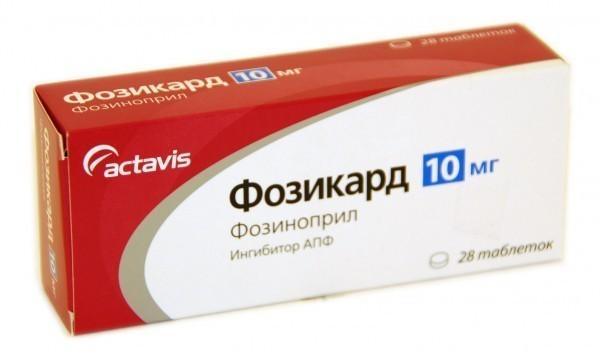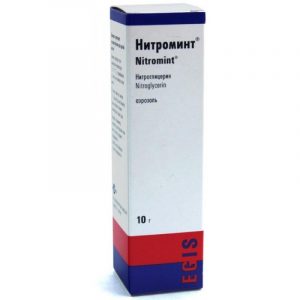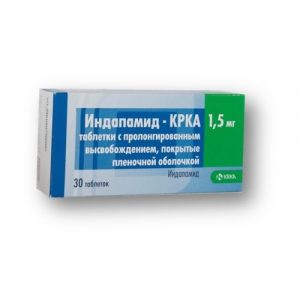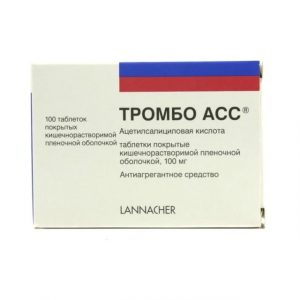Description
Release form
Tablets.
Packing
28 pcs.
Pharmacological action
Fozicard is an ACE inhibitor. Fosinopril is an ester from which an active metabolite, fosinoprilat, is formed in the body.
Fosinoprilat inhibits the conversion of angiotensin I to the vasoconstrictor substance angiotensin II, which leads to vasodilation, a decrease in OPSS and a decrease in aldosterone secretion. Due to a decrease in the secretion of aldosterone, a slight increase in the content of potassium ions in the serum occurs with the simultaneous loss of sodium and liquid ions from the body. The drug has antihypertensive, vasodilating, diuretic and potassium-sparing effects. The antihypertensive effect is also due to the suppression of the metabolism of bradykinin, which has a pronounced vasodilating effect. A decrease in blood pressure is not accompanied by a change in bcc, cerebral and renal blood flow, blood supply to internal organs, skeletal muscles, skin, and reflex activity of the myocardium. The antihypertensive effect of the drug persists with prolonged treatment, tolerance to the drug does not develop. After oral administration, the antihypertensive effect develops within 1 hour, reaches a maximum after 2-6 hours and persists for 24 hours.
Indications
– Arterial hypertension.
– Chronic heart failure (as part of combination therapy).
Contraindications
– Hereditary or idiopathic angioedema (including history) after taking other ACE inhibitors.
– Pregnancy.
– Lactation (breastfeeding).
– Children and teens under 18 years of age.
– Hypersensitivity to fosinopril and other components of the drug.
Caution is advised to use the drug in the following cases: – Renal failure.
– Hyponatremia (risk of dehydration, arterial hypotension, chronic renal failure).
– Bilateral renal artery stenosis or single kidney artery stenosis.
– Aortic stenosis.
– Condition after kidney transplantation.
– Desensitization.
– Systemic diseases of the connective tissue, incl. SLE, scleroderma (increased risk of neutropenia or agranulocytosis).
– Hemodialysis.
– Cerebrovascular disease (including cerebrovascular insufficiency).
– ischemic heart disease.
– Chronic heart failure III and IV functional class according to NYHA classification.
– Diabetes mellitus.
– Inhibition of bone marrow hematopoiesis.
– Hyperkalemia.
– Elderly patients.
– Subject to a salt-restricted diet.
– In conditions accompanied by a decrease in bcc (including diarrhea, vomiting).
Special instructions
Patients with severe hypertension or concomitant decompensated chronic heart failure should begin treatment with Fosicard in a hospital setting. Before and during treatment with the drug, it is necessary to control blood pressure, kidney function, potassium concentration, hemoglobin, creatinine, urea, electrolyte concentration and liver enzyme activity in the blood. Against the background of taking Fozikard, the number of leukocytes in the peripheral blood should be periodically monitored, especially in patients with an increased risk of neutropenia (with impaired renal function and systemic diseases of the connective tissue). Due to the increased risk of developing arterial hypotension, caution must be exercised when prescribing the drug to patients on a low-salt or salt-free diet.
Composition
1 tablet contains 10 mg ph.
Excipients: lactose monohydrate, croscarmellose sodium, pregelatinized corn starch (starch 1500), microcrystalline cellulose, glycerol dibehenate.
Dosage and administration of
In case of arterial hypertension: before starting treatment for arterial hypertension, if possible, the previously used antihypertensive treatment should be discontinued several days before the start of taking Fozikard. The initial dose is 10 mg 1 time / day. In the future, the dose must be selected depending on the dynamics of lowering blood pressure. The average maintenance dose is 10-40 mg 1 time / day. In the absence of a positive effect of monotherapy with Fozicard, an additional prescription of diuretics is possible. If treatment with Fosicard is started against the background of diuretic therapy, then its initial dose should be no more than 10 mg with careful medical supervision.
In the treatment of chronic heart failure, the initial dose of Fozicard is 10 mg 1 time / day. Next, the dose of the drug is selected in accordance with the dynamics of therapeutic effectiveness, increasing by 10 mg with a weekly interval. The maximum dose is 40 mg / day. Perhaps the additional purpose of diuretics.
Side effects of
From the cardiovascular system: decreased blood pressure, orthostatic hypotension, tachycardia, palpitations, arrhythmias, angina pectoris, myocardial infarction, chest pain.
From the digestive system: nausea, vomiting, constipation, intestinal obstruction, stomatitis, glossitis, dyspepsia, abdominal pain, anorexia, cholestatic jaundice, pancreatitis, hepatitis.
From the respiratory system: dry cough, shortness of breath, pharyngitis, laryngitis, sinusitis, pulmonary infiltrates, bronchospasm, dysphonia.
From the urinary system: the development or worsening of the symptoms of chronic renal failure, proteinuria, oliguria.
From the side of the central nervous system and peripheral nervous system: stroke, cerebral ischemia, dizziness, headache, weakness when used in high doses – insomnia, anxiety, depression, confusion, paresthesia.
On the part of the sensory organs: hearing and vision impairment, tinnitus, disorders of the vestibular apparatus.
Allergic reactions: skin rash, itching, angioedema.
On the part of laboratory indicators: hypercreatininemia, an increase in urea concentration, an increase in the activity of hepatic transaminases, hyperbilirubinemia, hyperkalemia, hyponatremia, a decrease in the concentration of hemoglobin and hematocrit, neutropenia, leukopenia, eosinophilia, and an increase in ESR.
Drug Interactions
Antihypertensive drugs, diuretics, opioid analgesics, general anesthetics while using Fosicard enhance its hypotensive effect. NSAIDs and estrogenic drugs with simultaneous use reduce the severity of the antihypertensive effect of Fozicard. With the simultaneous use of Fozikard with potassium preparations, potassium-sparing diuretics, the risk of developing hyperkalemia increases. Fosicard enhances the hypoglycemic effect of sulfonylurea derivatives, insulin. With the simultaneous use of Fozikard with allopurinol, cytostatic drugs, immunosuppressants, procainamide, the risk of developing leukopenia increases. With the simultaneous administration of Fozikard with lithium salts, an increase in the concentration of lithium in the blood is possible.
Overdose
Symptoms: marked decrease in blood pressure, bradycardia, shock, disturbance of water-electrolyte balance, acute renal failure, stupor.
Treatment: stop taking the drug, place the patient in a prone position with raised legs. In mild cases of overdose – gastric lavage, the introduction of sorbents and sodium sulfate for 30 minutes after administration. With a decrease in blood pressure – the on / in the introduction of catecholamines, angiotensin II with bradycardia – the use of a pacemaker. Hemodialysis is ineffective.
Storage Conditions
The product should be stored at a temperature not exceeding 25 ° C.
Deystvuyuschee substances
fosinopril
Form of Treatment
tablets
Zdravle HFZ AD, Serbia




